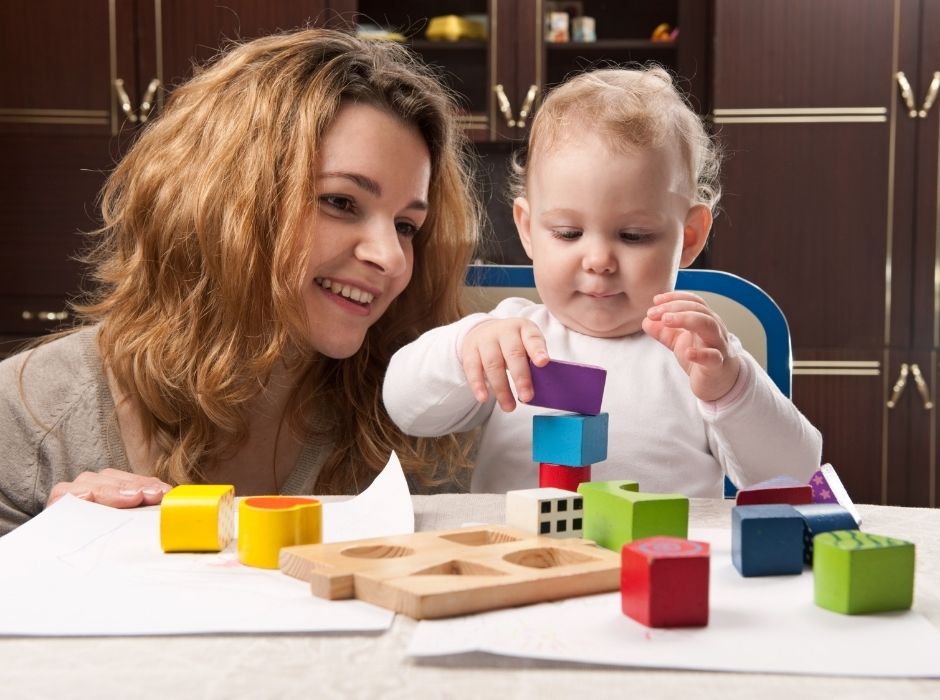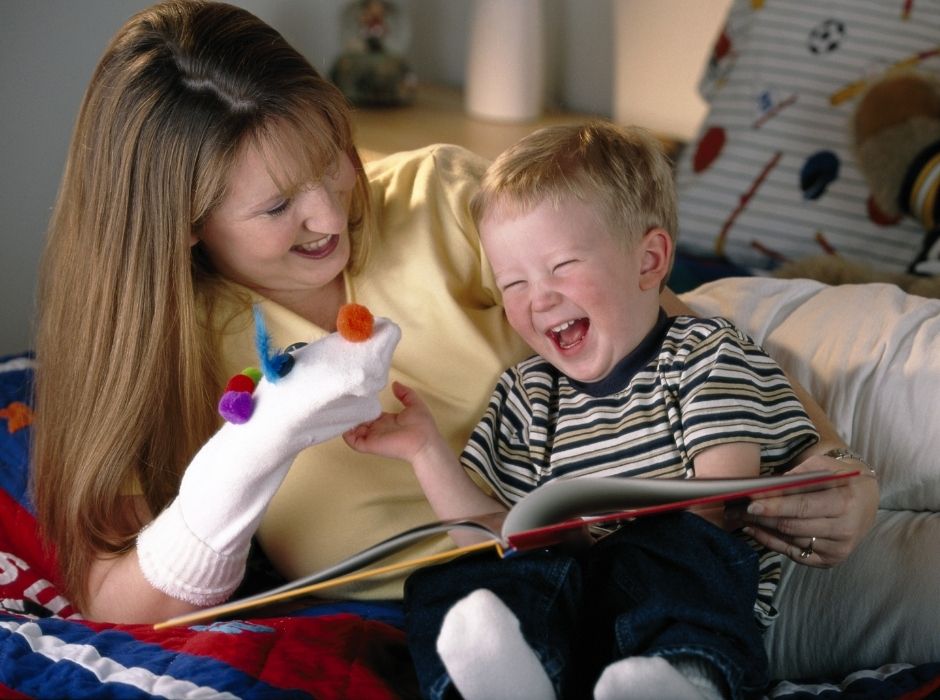What does a child who’s well-fed, rested, clean, and content crave more than anything? Play, of course! A nurturing parent understands the vital role of games in a child’s life, recognizing that carefully selected activities are crucial for proper psychomotor development. However, let’s not forget the sheer joy of play for play’s sake. Sometimes, the most valuable moments are those spent in light-hearted fun with your little one. While it might seem trivial at first glance, even the simplest game can be a powerful learning tool. After all, for children, play isn’t just fun—it’s a fundamental part of their educational journey.
Here is a series of activities that you can carry out with your little ones while anxiously waiting for daddy (or mommy) to come home, to cut yourself some slack.
Begin by constructing towers using an array of materials—building blocks, logical blocks, or even simple plastic cups. Don’t set your expectations too high, though; your little one’s excitement might topple the structure before you’ve even stacked three pieces! When the inevitable crash occurs, seize the opportunity to introduce language by pairing the fall with a lively word or sound. Try exclaiming “Boom!” “Crash!” or “Whoopsie-daisy!” as the blocks tumble. This playful association not only amplifies the fun but also subtly nurtures your child’s budding speech development.

For this engaging activity, gather two small cups, a spoon, and a substance for pouring—the choice between solids or liquids depends on your child’s age and dexterity. Begin by filling just one cup with your selected material, perhaps colorful pasta or sand. Next, guide your child in the art of transferring: encourage them to scoop with the spoon and carefully pour the contents into the empty cup. This simple yet captivating game draws inspiration from Maria Montessori’s concept of “travasi” (pouring). According to her extensive research, this seemingly straightforward activity not only provides an enjoyable way to play with your child but also wields a profound influence on their intellectual growth, fostering concentration, hand-eye coordination, and early mathematical concepts.
Begin by settling comfortably on a carpet with your child. Take a soft fabric handkerchief and offer one end to your little one, gently tugging the other end towards yourself. At first, your child might be puzzled, but once they grasp the game’s concept, they’ll eagerly start pulling back. This is your cue to playfully pretend to fall, exclaiming with enthusiasm, “Wow, you’re so strong!” You’ll be amazed at how much joy this simple game brings—seeing truly is believing! Beyond the laughter, this activity serves a dual purpose: it not only entertains but also fosters your child’s motor skills and enhances their understanding of cause and effect.
“Here or there, guess where!” This catchy tune rings out whenever my 3-year-old daughter plays this timeless game with her one-year-old sister. Indeed, it’s a game as old as the hills, yet it never fails to captivate. Our grandmothers played it with us, and we all know it well. To begin, conceal a ball—or any object of similar size (I often use my little girl’s rolled-up sock)—in one hand and ask, “Where is it?” When your child guesses correctly, don’t hesitate to reward them with enthusiastic applause! This game not only sharpens visual attention but also provides another joyful excuse for making noise. Moreover, this simple activity nurtures your child’s observational skills and bolsters their decision-making abilities.
Transform your child’s socks into lively hand puppets and embark on a storytelling adventure. Engage your little one in whimsical tales and playful chatter using these simple yet charming creations. You’ll be amazed at how much delight this brings! These imaginative games that tap into creativity will consistently captivate your young child, offering endless entertainment. Beyond the fun, such activities foster your child’s language development, nurture their imagination, and enhance their social interaction skills. The key to success lies in your spontaneity and playfulness; your child will treasure these special moments of connection and creativity.

Begin with a plastic tray or a shallow, rectangular food container. Fill it with a thin layer of sugar, creating a canvas for creativity. Offer your child a small stick or even their finger, and watch as they delight in drawing patterns as if on a miniature beach. This simple yet captivating activity provides a rich sensory experience while honing fine motor skills and nurturing creativity. It’s an ideal way to playfully introduce basic writing or drawing concepts. As your child explores this sugar-coated world, remember to supervise closely to prevent any accidental tasting. For variety, experiment with different textures by substituting sugar with salt, flour, or cornmeal, each offering a unique sensory adventure.

Don’t underestimate the power of this seemingly simple game—it’s a surefire way to delight your little one! We all know children love dropping things, so let’s channel that natural inclination into a fun activity. Begin by gently tossing a ball into the air. Then, playfully pretend you can’t catch it, letting it bounce around as you exclaim with exaggerated dismay, “Oh no, I lost it!” or any other amusing phrase that comes to mind. Watch as your child erupts with laughter and excitement! This lighthearted game does more than just entertain; it helps develop your child’s hand-eye coordination and reinforces their understanding of cause and effect. Best of all, it creates precious moments of connection through shared giggles and silly antics, strengthening your bond with your little one.

Transform your kitchen into a musical playground with everyday items! Plastic bottles filled with chickpeas or small pasta become perfect shakers, while empty cans or food containers make excellent improvised drums. For a more exotic sound, pair a food strainer with a wooden spoon to simulate a güiro. With these homemade instruments at hand, you and your child can explore a world of sounds, inventing tunes or simply reveling in joyful noise-making. As any parent knows, kids have an uncanny enthusiasm for creating sounds—loud ones, in particular! This DIY music adventure does more than just entertain; it nurtures your child’s auditory skills, sparks creativity, and cultivates a sense of rhythm. It’s also an engaging way to demonstrate cause and effect, as your little one discovers how different actions produce various sounds. So, embrace the cacophony and let your budding musician explore the symphony of everyday objects!
This suggestion isn’t as wild as it might seem. Watching animal video clips while narrating can be both educational and entertaining. It’s a great way to expand your child’s vocabulary and spark curiosity about nature. While they won’t grasp complex concepts like a bee’s entire life cycle, they’ll be captivated by the images and your voice. This interactive experience sharpens observational skills and builds knowledge about animals and their habitats. It’s also a perfect bonding opportunity, allowing you to share in your child’s wonder as you explore the animal kingdom together. Grab a nature documentary, settle in with your little one, and embark on a wildlife adventure from your living room!
As a perfect complement to animal documentaries or as a standalone activity, dive into the world of animal impersonations. Make funny faces and mimic the sounds of various creatures—from tiny mice to majestic horses. Children of all ages delight in these amusing vocalizations; it’s no wonder Disney created the beloved character of Donald Duck with his distinctive voice. This simple yet engaging activity goes beyond mere entertainment. It sharpens your child’s auditory recognition skills and ignites their imagination. It’s also an enjoyable way to introduce different animals and their unique sounds. By joining in this silly game, you’re not just teaching—you’re building a stronger bond with your child through shared laughter and creativity.
Every moment you play with your children creates a special connection. Playtime is more than just fun; it’s a precious opportunity for joy and sharing. These experiences imprint useful information for their growth in their memories, along with pleasant feelings. Remember, you are both an example and a guide to your children, as well as the center of their universe. Embrace these playful moments—your children will cherish them, and thank you for them, in years to come.
For children over 2 years old, technology can be a valuable ally when used judiciously. Carefully select age-appropriate apps and set reasonable limits on screen time. Smart Tales, for instance, offers entertaining stories featuring amusing farm animals, coupled with simple games that introduce children to shapes and colors. These interactive experiences can complement traditional play, providing a balanced approach to early learning and entertainment.